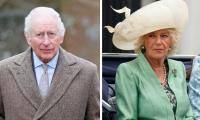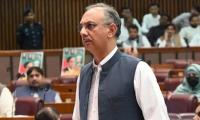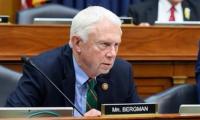Pakistan was the first country in the world to reassure its minorities about their future rights by specifically allocating a portion of the national flag — the white colour which traditionally represents purity and innocence — and which the minorities have kept so, over many decades. They have not allowed it to be polluted or defiled by blood, or any other stain.
In this critical year 2019, when the Indian government has taken an aggressive step in Kashmir, ignoring all the UN resolutions and violating the special status of Kashmir, originally proposed by Indian prime minister Pandit Jawaharlal Lal Nehru himself in 1948, it is well to contrast this with the plans and attitude of the Quaid-e-Azam towards the minorities in 1940s.
Quaid-e-Azam reminded us again and again that Pakistan had been created for the Muslim minority in India, and as such it understood the pains and sufferings of minorities, and that it will treat its own minorities with justice, equality and respect, and will not only be accommodating but also be generous towards all its own minorities.
Thus, on 3rd February 1948, in reply to Karachi’s Parsi community spasnama, he assured them that Pakistan would keep true to its often repeated promises. He told them Pakistan is the fulfilment of dream of a nation which found itself a minority in the Indian sub-continent. Therefore Pakistan can never forget the minorities living within its borders.
In the struggle for Pakistan, the minorities especially the Christians played a crucial role and cooperated fully with the Quaid. He told a delegation of the Christian parliamentarians on 20th November 1942, ‘if you help the Muslim League to make Pakistan, we will never forget you after Pakistan comes into existence, the Muslims will never forget your contribution. The Christian minority will be a sacred trust for us and the protection of their lives and properties will be part of our duties.’
The Christian community in India felt closer to the Muslim League than the Congress, for a number of reasons, mainly because as a representative of a minority community, the League understood the problems of Christian community much better. But the second important reason was the trust the Christians had in the personality and ability of the Quaid to look after the interests of minorities in Pakistan.
In his meeting with the Dewan Bahadr S P Singha, the Christian leader and the speaker of the Punjab Assembly at the time, on 18th April 1947, he called on the Christians raise their voices in favour of Pakistan and believed with the help of Punjab’s Christians, Pakistan would become a reality. He said their help would be remembered by the Muslims generation after generation, as the Christians, who are people of the Book, have a special relationship with Muslims.
Subsequently, appearing before the Boundary Commission on behalf of the Joint Christian Board, an umbrella organisation consisting of four Christian organisations, Mr S P Singha emphasised the Christians’ feeling of affinity and solidarity with the Muslims, he said, ‘Our people have been living with the Muslims for a long time. They trust the Muslims, they dress like Muslims… With Muslims they have a religious affinity.’
The Christian leaders tried to include the whole of Punjab into Pakistan. When it became impossible, they ensured that at least Western Punjab becomes part of Pakistan, by all the Christian leaders voting in favour of Pakistan. When the vote was tied in the Punjab Assembly, Mr S P Singha, the speaker of the Punjab Assembly, cast his vote in favour of West Punjab becoming part of Pakistan.
The Quaid did not forget and at the Constituent Assembly on 11th August 1947, under the chairmanship of a Harijan, Joginder Singh Mandal, he declared:-
“You are free to go to your temples. You are free to go to your mosques or to any other place of worship in this State of Pakistan. You may belong to any religion, caste or creed-that has nothing to do with the business of the State”.
He went on to state that there was to be no discrimination on the basis of caste or creed and all would be equal members of State. This unambiguous statement suggested that Pakistan would be a pluralist democracy, with a Muslim majority.
His choice of Mandal, as the first Law Minister, and in his cabinet, suggested that the country would not be run by the theocrats.
This theme of equality was repeated again and again throughout his remaining short life. On 11th October 1947, speaking to the officers of the Armed Forces he said one question which had been going around his head was the treatment of minorities. He said he would repeat it again and again in public and private statements that ‘we will treat minorities with justice’.
After the independence, the minorities contributed to make the country strong and powerful for example the Christians have played a prominent role in the armed forces of Pakistan. The Pakistani Army has a list of 52 Christian officers and soldiers, who sacrificed their lives to protect the honour of the mother land.
Recently, the members of the Hindu community have started to join the Pakistan Army; Pakistan has appointed its first-ever Hindu officer — Dr Kelash Garvada — a Major in the Ministry of Defence.
The distinguished Pakistan Air Force pilots include: Cecil Chaudhry, Peter O Reilly, Martyred Wing Commander Mervyn L Middlecoat, winning Sitara-e-Jurat twice and many other have won numerous awards for their bravery. Similarly, the Navy has a list of outstanding officers and sailors, prominent among them Rear Admiral Lesley Norman Gavin (Sitara-e-Basalat and Sitara-e-Imtaiz).
Coming to the field of education, the colleges like FC College in Lahore, Murray College in Sialkot, Gordon College in Rawalpindi and Edwardes College in Peshawar, have produced hundreds of thousands of outstanding graduates in every field. The Missionary schools were famous for their high standards of education and nearly all our leaders from Quaid to the present government ministers, started learning their alphabet in those schools.
In the medical arena, at one time the Christian nurses monopolised the profession and helped the medical profession to stand up on its feet in the newly independent republic. One name which comes to mind immediately is the Ruth Pfau, who spent all her life serving the lepers, when nobody else would come near them.
This ‘Mother Teresa of Pakistan’ was given a state funeral which was attended by the state dignitaries. The mission hospitals in far-flung places of the country were the true pioneers of spreading the 20th century medical benefits to those inhabitants.
Similarly the third pillar of the state – Judiciary — who can forget the service of Chief Justice A R Cornelius, Chief Justice Rana Bhagwan Das, and Justice Patel.
After 70 years of independence, the role of minorities is not generally known to a majority of their compatriots. Unfortunately, some anti-social and mean elements have been instrumental in occasionally perpetrating activities against members of minorities. There had been sporadic incidents from Gojra to Shanti Nagar, making lives difficult and negating commitment made by the Founding Father of Pakistan. Alleged kidnappings and forced conversion and reported marriages of the underage Christian girls in Punjab and the Hindu girls in Sindh; the use of inappropriate language and the misuse of the blasphemy laws to settle personal scores or to control of the properties of the minorities, and unequal opportunities for the minorities; are some of the weaknesses, which make the minorities uneasy and uncomfortable in their own country. These weaknesses have given a reason to the critics of Pakistan to exploit it to the country’s disadvantage.
Despite the odds that the minorities face, they love their country and have continued to serve it in many different ways — the country for which their forefathers rendered ultimate sacrifices during independence movement, contributed to its development in various sectors and always stood by in the country’s thick and thin.
We are happy to note that recently, the Government has taken a few positive and welcome initiatives such as opening the Kartarpur Corridor for the Sikh Yatrees and the Katas Raj temple complex for the Hindu Yatrees. The Prime Minister Mr Imran Khan, has made very positive statements about the alleged forced conversions and marriages of non-Muslim girls being against Islam and hence wrong. The government also stood firm against the militant mobs, when Asia Bibi was released by the Supreme Court.
I would also like to mention the present Pakistani High Commissioner to the UK, His Excellency Mohammad Nafees Zakaria, who has taken the initiative to keep the Pakistani minorities within the national stream for example, he facilitated the first time ever a meeting of the British missionaries, who had served in Pakistan over the years, at the High Commission. We have found him to be a true representative of ALL Pakistanis.
It is very clear that the Quaid-e-Azam was committed to developing Pakistan into a democracy with equality of citizens together with guaranteed human rights and civil liberties. Unfortunately, his dream of a tolerant, inclusive and forward-looking country was betrayed by those who followed his illustrious career.
Let us go back to the promises of our leader Quaid-e-Azam, and start to live in our great country with the golden principles of equality, fraternity and justice for all, irrespective of our differences. Pakistan is a multicultural bouquet of many religions, languages and cultures, and the differences only add to its beauty.
The need for unity has become even more paramount in view of the recent offensive steps undertaken by the Indian government in Kashmir, unilaterally violating its own agreements with the United Nations, attacking the civilian population and disfranchising a whole nation.
Pakistan Zindabad.
The author is the former mayor of Rugby and is the recipient of an MBE and the Sitara-e-Pakistan.
Awareness campaigns should teach citizens how to become co-creators in Sci-Tech-Human Power Complex
Despite the poor performance of the national cricket team, its salaries are unbelievable
We need people to know that if you kill someone in the street, you will be hunted, arrested, tried and sentenced
President Trump’s recent aggressive tariff measures have inadvertently revitalised WTO’s importance
Xi signed several cooperation agreements with Malaysia focused on trade, services, industrial parks and agriculture
This Earth Day, it’s time for us to act decisively to save snow, secure our water and ensure resilient future for...







